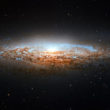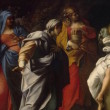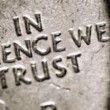How God Still Causes Things to Be
by Karlo Broussard
Filed under God

Atheists often claim that it’s contradictory for believers to assert that God is at the same time both the universal cause of all being and immutable. In other words, God can’t be changeless and at the same time changing, in the sense that he causes things to come into and go out of existence. Consider, for example, that my act of typing this article right now is a reality ultimately because God causes it to be. His causal activity is not in opposition to my free action, but the presupposition... Read More
5 Reasons Why the Universe Can’t Be Merely a Brute Fact
by Karlo Broussard
Filed under Cosmology

Can the universe be a mere brute fact? Can we say, “The universe just exists and that’s that—it has no explanation at all”? Sean Carroll, a theoretical physicist at the California Institute of Technology, thinks so. In a recent interview at Salon.com, Carroll says, “There’s certainly no reason to think that there was something that ‘caused’ it; the universe can just be.” Carroll is in good company with such an assertion. Bertrand Russell, the late British atheistic philosopher,... Read More
Why Wouldn’t God Perform More Miracles?
by Karlo Broussard
Filed under The Problem of Evil

If God is a God of miracles as theists claim, then why doesn’t he perform more to stop evil? I must admit this is one question I’ve wrestled with in solidarity with my atheist friends. My initial response is to recall the words of the prophet Isaiah: “For my thoughts are not your thoughts, neither are your ways my ways, says the LORD” (Is. 55:8). While I acknowledge this as true, it leaves me dissatisfied. As a Christian I believe, with St. Paul, that God “works for good with those who... Read More
How Do You Know You’re Not in the Matrix?
by Karlo Broussard
Filed under Man

At the heart of the philosophy of Aristotle and St. Thomas Aquinas is the idea that we come into contact with reality through the senses. But what if our senses are not a reliable source? Perhaps our senses are deceiving us, and everything we perceive isn’t real but is merely an illusion like in the movie The Matrix. Descartes This skepticism of sense knowledge was part of René Descartes’s methodic doubt, which many radical skeptics have adopted. Descartes argued: Whatever I have up till now... Read More
Why Miracles Are Not Incompatible with Science
by Karlo Broussard
Filed under Christianity and Science

Skeptics argue that miracles are impossible because the laws of nature are necessary. A miracle, they argue, involves a violation of a law of nature. But the laws of nature cannot be violated. Therefore, miracles must be impossible. One modern skeptic of repute who argues this is Richard Dawkins. In his book The God Delusion, he says, “[M]iracles, by definition, violate the principles of science” (83). Dawkins and other modern skeptics derive this argument from philosophers in the seventeenth... Read More
What Constitutes a Miracle?
by Karlo Broussard
Filed under God

After reading some exchanges on Facebook that were inspired by my recent blog post concerning miracles, it became clear I need to explain exactly what a miracle is. A miracle is defined as an extraordinary sensible effect wrought by God that surpasses the power and order of created nature. That’s a mouthful, so let’s unpack it. There are five aspects to the definition. Aspect #1: Exclusively attributable to divine power Only God can be the cause of a miracle. This excludes any sort of occurrence... Read More
Why the Resurrection Was Not a Conspiracy
by Karlo Broussard
Filed under The Resurrection

When confronted with the early Christians’ testimony about the Resurrection of Jesus, it is natural to question whether it’s credible. A healthy skepticism demands we test the claims of such an event. One way to do so is by offering alternative explanations, and one such explanation is the conspiracy theory. This theory purports to explain Christ’s empty tomb and postmortem appearances by claiming the early Christians stole the body and made up the Resurrection story. I don’t fault anyone... Read More
Is It Reasonable to Believe in Miracles?
by Karlo Broussard
Filed under Belief

Should I believe in miracles? This question doesn’t pertain to whether I should believe in this miracle or that miracle. It has to do with whether I’m rationally justified in believing in miracles as such. David Hume's Wisdom for the Wise The eightenth-century Scottish skeptic philosopher David Hume argued the wise man should not believe in miracles. The basis for his assertion was what might be called the “repeatability principle”—evidence for what occurs over and over (the regular)... Read More
Is Real Knowledge Only Scientific Knowledge?
by Karlo Broussard
Filed under Science

Is science the only legitimate form of rational inquiry? The evolutionary biologist and popular atheist Richard Dawkins thinks so. In a 2012 debate with Rowan Williams, the former Archbishop of Canterbury, Dawkins claims that religion, as opposed to science, is “a betrayal of the intellect.” He asserts that appealing to God to explain the universe is “a phony substitute for an explanation” and “peddles false explanations where real explanations could have been offered.” What counts... Read More
Is God Necessary for Human Happiness?
by Karlo Broussard
Filed under God, Man

Christians have always heard that only God can make them happy. In fact, some Bible translations render Psalm 16:2 as, "You are my God. My happiness lies in you alone." But an atheist would say, “I don’t need God to be happy. I can get along just fine without him.” It is true that an atheist can experience kinds of happiness without living for God. But if an atheist persistently and culpably rejects God, Fr. Robert Spitzer argues in a new book, he will not be able to experience ultimate... Read More







